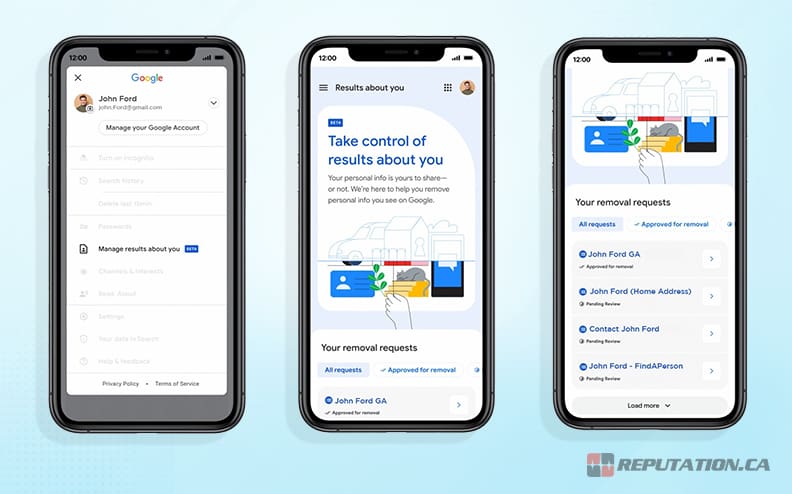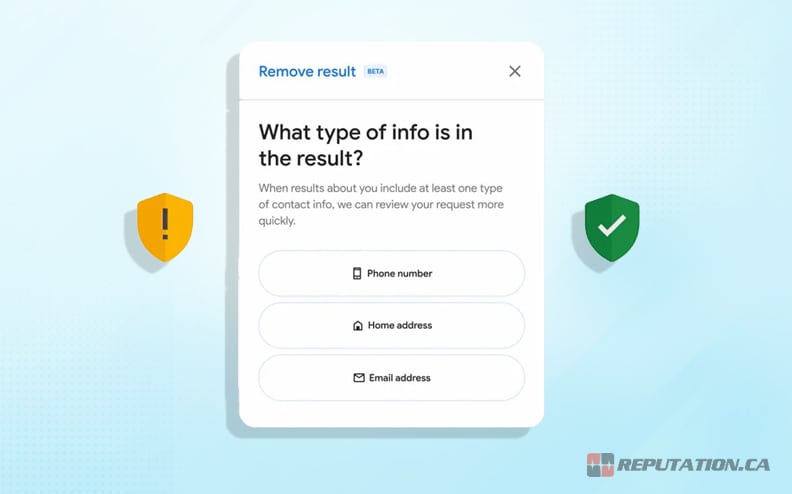Most of our information is not easily accessible, but private data can reach the general public through 3rd parties who gather your information. When certain 3rd party agencies gather your data to offer their services, they internalize the data with your customer profile. Unfortunately, this information can sometimes leak from these sites and be listed on general websites.
These websites allow average users to access information about you that should never be made available to others. Even more disturbing is that this information can be located via a standard Google search. Fortunately, Google has taken measures to help you protect your private information.
Google has recently launched a new function in the search engine, the “Results About You” function. The introduction of this setting has enabled people to control the information available to average users. Through this curation of Google results, it is possible to protect your data from being abused.
While this tool is extremely useful, it is also very new, which makes using it a little more complicated. Once you understand how to operate Google’s new tool, you should find your information is more secure than ever before.
What are “Results About You?”
Google’s Results About You was originally announced in May 2022 at I/O and was marketed as a tool to streamline the process of removing search results. Google has always offered a method for purging results from searches when they compromised the safety of the users. When the Results About You tool was announced, it was pitched as a way to keep contact information and personally identifiable information off the internet. The tool is set to help all users protect their data, and it officially saw an initial rollout on September 28th. The current model is not fully integrated but is sufficient enough to help users get a start on protecting their information.
Accessing the Results About You setting is fairly simple so that every user can use the system. Accessing the current model requires you to click on your profile picture on the Google domain, where a list of tools will pop up. The 3rd item on the list should say “Results about you” with the word “Beta” to the far right. This qualifier is because the tool is still being developed and rolled out and is not fully integrated yet. Clicking on this will enable you to activate your Google account’s Results About You system.

Because the system is under development, its current features are not final. Other features for the Results About You tool are planned for release later in the tool’s lifetime. The most important future feature is the ability to opt into an alert system that informs you when a new result appears that contains your personal data. This system will allow you to remain aware of potential privacy breaches. While there is no set release date for this function, Google has stated that the notifications should arrive early next year.
Currently, this function has only become available in the United States and Europe but not completely. If you are in a region where the function is available, all you need to do is activate the setting so you can begin regulating your information. While this might sound simple, you might be wondering what kind of information this tool can remove.
What Information Can “Results About You” Manage?
As we mentioned, the tool is meant to help Google users manage the accessibility of contact information and personally identifiable information. Online commerce websites can sometimes harvest this information to offer their services. While this information might be necessary for your ability to engage in online commerce, the problem is that it can be siphoned by other websites and accessed by people who do not need your information but might abuse it. Therefore, Google’s tool allows you to purge results that provide that information.
As for what qualifies as information suitable for removal, contact information is among the more common.

The Results About You tool allows you to remove results that contain your:
- Phone Number
- Home Address
- E-Mail Address
This information can compromise your safety and allow unsavory individuals who might abuse your contact information for personal gain to access it. Unfortunately, contact information is not the only personal information that might get into the wrong hands. This personally identifiable information is extremely sensitive and can allow cybercriminals to destroy your life. Examples of personally identifiable information include:
- Confidential government identification numbers. (i.e., social security numbers for U.S. citizens)
- Bank account numbers.
- Credit card numbers.
- Images of your handwritten signature.
- Images of identification documents. (i.e., driver’s licenses or passports)
- Personal and official records. (i.e., medical records)
- Login credentials.
This information is very sensitive and can be abused in some of the worst ways possible, making it crucial to keep it hidden from unauthorized eyes. While Google’s original system for requesting result removal allowed this information to be effectively purged if it met Google’s criteria, it wasn’t very straightforward. The “Results About You” tool recently introduced to Google’s platform operates on the same criteria but allows you to execute the request more simply.
Unlike the traditional removal request system, which requires you to go to a separate link and fill out the request, the Results About You tool allows you to click on the 3 vertical dots next to the link, where a submenu will pop up, and you can request the removal of the result. Once you have selected the removal option, you will be asked why you want to remove the result, and there will be a list of preset answers:
- It shows my personal contact info.
- It shows my contact info with an intent to harm me.
- It shows other personal info.
- It contains illegal info.
- It’s outdated.
Once you select a cause, you will be redirected to Google’s main removal request page, where you will finalize the takedown request. Once the request is finalized, you will need to be patient while Google reviews the request to determine whether the result meets the criteria for removal. The result will be removed from Google’s page if your request is deemed valid. If the request isn’t deemed invalid, the result will remain on the results page and be available for general use.
While the Results About You tool can ease your efforts to request the removal of Google results, you might be unsure about the value of such a tool. However, failing to regulate the presence of personal data on Google’s domain can lead to serious issues in your personal life.
Why You Should Manage Your Data
Managing the presence of your personal information on websites like Google is not only important but essential to keeping yourself safe. When personal information becomes available to people outside your private circle, you are put at serious risk. Cybercriminals spend years trying to mine personal data to abuse for their own profit, but this is made much easier for them when the data is left on Google, where they can access it without issue. Even contact information can leave you vulnerable to the machinations of cybercriminals or generally dangerous individuals.
Contact information should be carefully regulated since dangerous people trying to locate you can take advantage of exposed data. An unfortunate reality of life is that stalkers and hostile people exist who will happily use this data to execute their plans. If you have an ex or enemy who threatens your safety, you likely do not want them to have access to your contact information. Allowing this information to fall into their hands allows them to harass you or even arrive on your property uninvited.
Unfortunately, even people who are uninterested in you can take advantage of your contact information. Most contact information can be used to create accounts under your name and pose as you. Given the rise of social media websites or racier websites like OnlyFans, having a stranger pose as you with such an account can severely damage your reputation. Any time a stranger uses this contact information to create an account while posing as you, their comments and content are attributed to you rather than the culprit.

These consequences become far more severe when considering the more advanced personal identifying information. Namely, having something as sensitive as your social security number exposed on a Google search result can devastate your life.
Social security numbers essentially serve as the ultimate form of identification in the United States that determines our ability to apply for government-enforced documentation like passports, credit cards, and identification paperwork. Everyone’s social security number is unique to them, and everyone only receives one number in their lifetime. This means you must viciously protect your social security number if you want to preserve your identity.
Identity theft can directly impact your personal and financial reputation and leave you essentially destitute. While it might not be common for our more sensitive personal information to be made available on a general Google search, you should consider the potential of your data reaching easily accessible websites.
With this in mind, using tools like Google’s Results About You can help protect your reputation and safety while removing the links that contain your data. Unfortunately, managing these details can be extremely challenging if you attempt to manage your reputation alone.
What if Google Cannot Help?
Despite the Results About You tool existing to streamline removal requests, there are limitations to what Google can remove. As mentioned above, the system aims to remove access to important private information. That said, the requests made for these removals must meet Google’s requirements before they can approve a request. We have already established that personally identifying information is an approved reason to have a result removed. Still, the other 2 types of information that meet Google’s standards are exploitative content and non-consensual intimate images.
Exploitative content is any content that actively harms you and expects payment to have the harmful information removed from their domain. Non-consensual intimate images involve posting private photographs or videos of you in compromising positions. If the result you are trying to remove does not meet these criteria, the request will likely be denied preserving the rights of the domain to post its content.

Unfortunately, just because the content does not compromise your safety does not mean it is harmless. You likely want the information removed due to the potential reputational damage.
When Google is unwilling or unable to remove the content, you might have to take matters into your own hands. Namely, you might have to reach out to the domain owner and ask them to remove the content themselves. Unfortunately, they are not obligated to concede, and in extreme cases, you might need to seek legal action.
Take Your Reputation Back!
Google is one of the world’s largest and most successful search engines and must juggle the needs of all its users. When personal information is posted in the public domain, Google tries to offer tools for removing this data, so your safety and reputation are not compromised. The Results About You setting has simplified this system and enabled more users to remove results that make their private data public.
Unfortunately, the longer the information goes unnoticed, the higher the chances of someone abusing the information. While you can Google yourself to search for signs of leaked information, you might need some help tracking these leaks.

We at Reputation have made it our mission to help our clients manage their reputations by seeking any damaging information on your behalf. Once the information is located, we can take things further and file the removal requests for you. Managing a reputation is extremely difficult, especially for individual citizens who do not have the resources to launch massive campaigns.
Whether it is Google search results or any other medium that impacts your personal image, we can help in preserving your image. So, feel free to visit our website and assess our service packages and see if any suits your needs. Now is the time to take your reputation back, and we’re standing by and ready to assist you in doing so!







